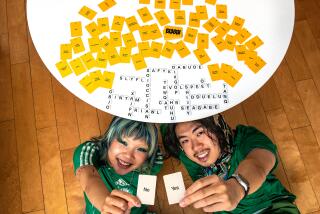How spell-check changed my life
- Share via
Spelling bees and dodge ball, I was the first one out. I like to blame both ineptitudes on the lateralization of brain function, the left-brain / right-brain thing. I am left-handed. Everyone knows that lefties can’t spell well and that when a big, red ball is coming right at us, we’re invariably looking the other way.
My teachers, however, weren’t interested in that excuse. Nor were they charmed by Mark Twain’s quip, “I don’t give a damn for a man that can spell a word only one way.” My handwriting, a leftie’s scrawl, also posed a problem, but not as much as the misspellings.
“If you’re not sure how to spell a word, look it up in the dictionary,” my teachers told me, never-minding the inherent illogic: How are you supposed to look up a word you can’t spell in a book where the words are arranged in alphabetical order? You need to know how to spell it to find it. Or, as I came to learn, you begin with a guess and eventually, through trial and error, stumble upon the troublesome word.
I’m not dyslexic; I can, in a rough estimate, spell nine out of 10 words correctly. But nine out of 10 in the standard junior high school 300-word essay sent me to the dictionary approximately 30 times. There was often the temptation to skip it, to say, “Close enough,” but the specter of misspelled words circled in red, a pox upon my essay, resulting in a lowered grade (Spelling counts!) would prompt me to reach for the dictionary.
When I started writing fiction, 300-word essays became 3,000-word stories. Half my writing time was converted into dictionary hours. Just before I started my first novel, spell-check arrived. Had it not, I might still be working on that book.
English is a language riddled with exceptions to the rules, and phonetically speaking, it’s absurd. Remember: gh-o-ti (fish). Trial and error can be a time-consuming process, in part because it is pretty much impossible not to take notice of other words encountered along the way. Looking up the word “curriculum” -- which I am always sure begins c-i -- led me to “cinerarium: a place to receive the ashes of the cremated dead.” And who would not pause to consider “circumstellar” or “Clactonian,” in the adjacent column? After eliminating c-o (core-iculum?), I got to c-u-r, “curettage” and “curium: a metallic radioactive element produced artificially.”
My mother used to say that I was born talking; hyperbole (and why isn’t that pronounced hyper-bowl or spelled hyperbullee?), for sure, but I was smitten with words: what they meant, the stories they told, the images they conjured. I longed to visit Mozambique and Mesopotamia for the sound of the words alone. And the marvel of onomatopoeia (what’s with that string of vowels at the end?): “buzz” was funny enough; “burp”nearly killed me.
I’ve seemingly digressed to get to “arbitrary,” my favorite word of fifth grade. No doubt I would’ve come upon “arbitrary” at some later point in life, but Mrs. Watkins had us write an essay to commemorate Arbor Day. “Arbor,” it turned out, is not spelled with a u, like “burn,” and turning back a page in the dictionary, I fixed on “arbitrary.” Arbitrary. What a word! That year, I used it constantly, most often incorrectly, riotously so with my valediction: “Arbitrarily yours, Binnie,” which would’ve been a joy never lived had I known how to spell “arbor.”
Now, I don’t need to know how to spell “arbor” or any other word. Spell-check corrects the misspelled words or flags them, offering me a list of possibilities, which are sometimes amusing. My own name, Binnie, gave my first computer pause. Among the five or six replacement words were bean, binnacle and bunny. I didn’t know what a “binnacle” was, but technological wonder of wonders, the definition was but a click away. And yet, I never took to the computer’s dictionary. It seems too flimsy, not complete, as if not up to the task of multiple definitions or the many possible nuances of a given word.
Spelling, though, that’s different. With the occasional exception -- because this is English -- there is but one way to spell a word. (Mark Twain be damned.) Spell-check, I am fond of saying, has saved my life, which is hyperbolic for sure. Spell-check has not saved my life, but it has saved me hours and hours of looking through the dictionary for the correct spelling of one out of 10 words.
Yes, spell-check has saved me hours and hours otherwise spent reading the dictionary, saved me from that particular pleasure of discovery, to happen upon words like “furbelow: a pleated or gathered piece of material,” or “soilure: the condition of being soiled,” or “nulliparous,” which my spell-check flagged but had no replacements for. “Nulliparous: one who has never borne an offspring.” Nulliparous is a word I’d never before said, read or heard spoken, and I was tickled by it, in no small part because I happen to be one.
Time saved is not the opposite of time wasted.
Nulliparously yours,
B.
Kirshenbaum’s new novel, “The Scenic Route,” has just been published. She is a professor at Columbia University’s School of the Arts.
More to Read
The biggest entertainment stories
Get our big stories about Hollywood, film, television, music, arts, culture and more right in your inbox as soon as they publish.
You may occasionally receive promotional content from the Los Angeles Times.










